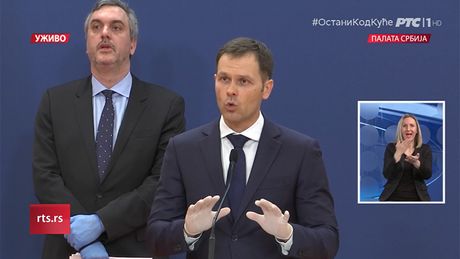Coronavirus economic measures: Minimum wage for each Serbian worker, €100 assistance to each citizen
A program of economic measures to reduce the negative effects caused by the coronavirus pandemic has been adopted in Serbia. It contains a financial injection to support workers in the form of wages, and support businesses in terms of taxes and liquidity.
The assistance also applies to companies in the form of coverage of minimum wages for each worker, special benefits for micro, small, and medium-sized enterprises, for which EUR 700 million will be set aside.
"I stand here with comprehensive measures. The fight is on for each job. Secondly, (there's) assistance to small, micro and medium enterprises," said Minister of Finance Sinisa Mali.
As he said, half of the annual state budget is the amount the state has now prepared to help the economy. That, he added, is a package worth almost 700 million euros - 11 percent of our GDP. The package of assistance measures has been divided into 4 parts.
The first measure
- delay of payment of taxes and contributions
- delay of payment of income taxes
- exemption from payment of VAT
The second measure
Direct assistance in the amount of three minimum (monthly) wages to all companies, for each worker.
"To all entrepreneurs, lump sum taxpayers and small businesses, we will give three minimum wages for each worker employed by these enterprises - the state will deposit just over 90,000 dinars directly into their accounts. The government is also proposing paying 50 percent of the wages of those who have been fired (about 900,000 people), said Mali.
The third measure
Mass liquidity support, 200 million euros - i.e., 2.2 billion euros from the Development Fund, cheap loans. These are the loans guaranteed by the state.
This program will not apply to those businesses that have reduced their workforce by more than 10 percent.
The fourth measure
Assistance to every adult citizen of Serbia in the amount of 100 euros.
"We will allocate about 70 billion dinars from the budget in order to give each adult citizen the amount of 100 euros, in Serbian dinars," said Mali. He stressed this was a great signal of support and a desire to bring in a dose of optimism.
"To show how strong Serbia is at the moment, capable of giving each citizen around 12,000 dinars. This is good for increasing spending, liquidity, but also for the way we, as a state, want to support all citizens as we are going through all this together," said Mali.

Corporate bonds
Mali pointed out that one way of financing would be to introduce corporate bonds.
"It is one way of financing that large companies can count on. In our country, the regulation is a little complicated, so we are working on adjusting it so that large companies can find the funds for new investments and new growth."
"It's not our fault, the whole world is in crisis"
Presenting the package of measures, Mali said this crisis is not our fault, but that it has hit the whole world. He said that's why the state would bear the brunt of the measures.
"The government remains consistent in that there will be no pay cuts and layoffs in the public sector, pensions will remain the same. Also, respect for private entities, job security and inflows," he said.
"People have problems, so we had to press for measures to be introduced as soon as possible and to be the way they are - because they can preserve liquidity and jobs. These measures encompass all companies, in order to preserve their business, and so that when they overcome it all - they will have access to investment money," said Marko Cadez, president of the Serbian Chamber of Commerce (PKS).
"The PKS will partner with companies 24/7. We will discuss with the government how to make sure these measures reach those who need them most in the easiest and best way, those to whom each hour, each day matters," said Cadez.

What the measures encompass - the details
FIRST SET OF MEASURES:
For the most part it refers to the deferral of payment of taxes, with subsequent repayment in installments, at the earliest starting in early 2021:
- Deferral of payment of taxes and contributions to earnings is carried out in order to provide liquidity, maintain economic activity and employment.
Delaying the payment of payroll taxes and contributions from the private sector during a state of emergency aims to increase the liquidity of all business entities in the business sector that pay wages to employees. Also, this measure relates to deferring the payment of income tax on the self-employed activities of all entrepreneurs.
All employers who choose to use this measure can apply for a deferral of tax and wage costs trough the beginning of 2021, and thereafter leave the possibility of deferring these costs for up to 24 months without the obligation to pay interest at the taxpayer's request.
The basic conditions for implementing this measure are identical for all employers, regardless of their economic power.
- Payment of income tax advance payments in the second quarter is also postponed.
This measure aims to increase taxpayers' liquidity by delaying the payment of income tax advance payments for 2020 due in the second quarter of 2020.
The basic conditions to apply this measure are identical for all taxpayers of income tax regardless of their economic power.
- Exempting donors from their obligation to pay VAT. The measure aims at exempting donors who donate their products, or the products they trade in, to institutions directly involved in activities aimed at preventing the spread of the COVID-19 disease, and in medical treatment of the citizens.
SECOND SET OF MEASURES:
Refers to direct payments to enterprises, payment of minimum wage assistance for entrepreneurs, micro, small and medium-sized enterprises, i.e., subsidies of 50 percent of the minimum wage for large enterprises whose workers are on forced leave due to reduced business volume, or complete suspension of work.
Direct aid to flat-rate entrepreneur taxpayers who pay real income taxes in micro, small and medium-sized enterprises in the private sector - and payment in the amount of minimum wage minimum assistance (during a state of emergency); for large enterprises, payment of 50 percent of the minimum wage for workers who have been terminated.
In terms of how it is applied, this set of measures differentiates the economic strength of the taxpayer.
Accordingly, entrepreneurs, micro, small and medium-sized legal entities are provided with economic assistance in the amount of net minimum wage for each person who has the status of an employee.
For legal entities classified as large, assistance is determined in proportion to the number of workers retained by these employers, even though the need for their work has temporarily ceased to exist.
The proposed measures sufficiently stimulate employers to maintain the existing level of employment, while in the case of entrepreneurs, small, micro and medium-sized legal entities, the greater scope of rights further enhances liquidity in order to maintain business operations, i.e., abandon the initiation of proceedings to terminate business operations.
THIRD SET OF MEASURES:
It is aimed at preserving the liquidity of economic entities in the conditions of an economic crisis expected during and after the end of the emergency caused by the COVID-19 pandemic.
With this program, the government of Serbia wants to minimize external influences, such as declining demand and interruption of supply chains, and their consequences, such as employment rate decrease and a lack of liquidity, reflecting on the Serbian economy.
The program envisages two measures:
1. A program granting loans for maintaining liquidity and working capital to companies in the segment of entrepreneurs, micro, small and medium-sized economic entities, agricultural holdings and cooperatives registered in the relevant register through the Development Fund of the Republic of Serbia.
2. A guarantee scheme to support the economy in the conditions of the COVID-19 crisis through loans for maintaining liquidity and working capital for companies in the segment of entrepreneurs, micro, small and medium-sized economic entities, as well as agricultural holdings through commercial banks operating in the Republic of Serbia.
The total value of the programs envisaged by this measure is 264 billion dinars (about 2.2 billion euros).
FOURTH SET OF MEASURES:
Refers to payment of direct assistance in the amount of 100 euros in Serbian dinar equivalent to all adult citizens of Serbia.
(Telegraf Biznis)
Video: Počela manifestacija "Noć legata“
Telegraf.rs zadržava sva prava nad sadržajem. Za preuzimanje sadržaja pogledajte uputstva na stranici Uslovi korišćenja.

